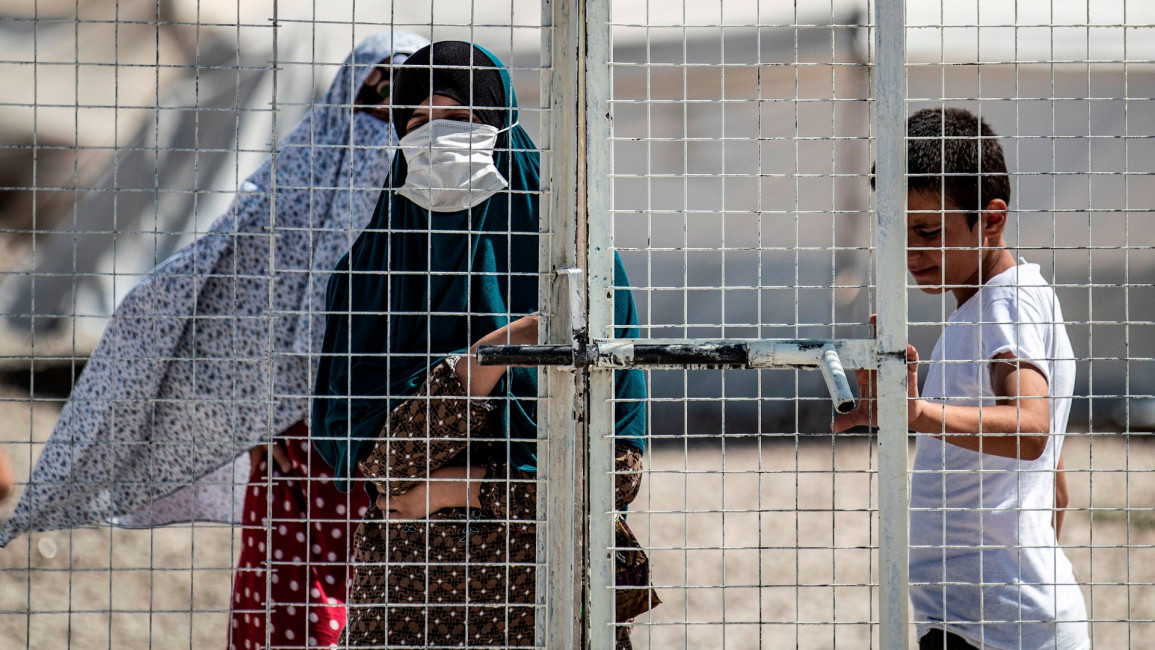Iraq's FM and US Ambassador to Iraq discuss repatriation of Iraqi families from Syria's al-Hol camp
Iraq's Foreign Minister Fuad Hussein, and United States Ambassador to Iraq Alina L. Romanowski, on Tuesday, discussed ways of relocating Iraqi families at the al-Hol camp in north-eastern Syria.
The camp, which is notorious for its poor conditions and violence, is home to about 50,000 people including family members of suspected jihadists. Around 27,000 of them are Iraqi civilians who escaped to neighbouring Syria due to the conflict between the Islamic State group and Iraqi government forces and their allied militias.
The IS extremists launched a brutal military campaign in Iraq and Syria in 2013 and 2014, marked by mass killings, torture, rape and slavery.
"Joint relations between Baghdad and Washington and ways for boosting them for the interests of the two friendly peoples, the issue of transferring families from al-Hol camp to a special camp inside Iraq, and challenges facing this process have been discussed during the meeting," the Iraqi foreign ministry said in a statement.
The ministry also noted that both sides discussed the upcoming meeting of the global coalition against the Islamic State, scheduled to be held next week in Saudi Arabia, with the participation of the foreign ministers of state members.
Iraqi FM @Fuad_Husseein & I discussed advancing the #USIraq360Partnership & we exchanged views on security + reintegration efforts prior to next week’s Global @Coalition to Defeat ISIS summit in Riyadh. Essential to repatriate Iraqis vulnerable to ISIS recruitment. @Iraqimofa
— Ambassador Alina L. Romanowski (@USAmbIraq) May 29, 2023
On her part, Romanowski tweeted that they discussed "views on security" and "essential to repatriate Iraqis vulnerable to ISIS recruitment."
Several Iraqi families have returned and are being held at Al-Jadaa camp, located in the southern Mosul province, where they are undergoing a rehabilitation program under the supervision of the United Nations.
Late in April, security sources told The New Arab's sister site Al-Araby Al-Jadeed that due to strict security checks, only 603 families returned to their homes throughout 2022.
TNA contacted Major General Khaled Al-Mahna, spokesperson of the Iraqi interior ministry, but he declined to answer whether the security checks for the returning Iraqi families are ongoing or not.
He indicated that the dossier of the displaced people is not the specialisation of the interior ministry, but falls under the mandate of the Iraqi Ministry of Displacement and Migration.
TNA also contacted Khalid Abdul Karim, the director of displacement and migration in Mosul, but he was not immediately available to comment.
Iraqi lawmaker Mahdi Taqi Amirli has told Al-Araby Al-Jadeed that there are US pressures on Iraq to repatriate Iraqi families from the al-Hol camp, meanwhile, related Iraqi authorities are refusing to repatriate the families without checking their security dossiers in detail.
An Iraqi security source also told the outlet that both the US and Iraq have similar views on the importance of closing the al-Hol camp and repatriating its residents to their countries of origin during a fixed period of time.
"Six months ago, a committee was tasked with repatriating the Iraqis from al-Hol camp to their hometowns after their rehabilitation in society, but so far the committee has done nothing, due to political circumstances," Sagvan Sindi, the deputy head of the Security and Defence Committee in the Iraqi parliament, told TNA during a telephone interview.
"Some political parties and Iraqi militias are hindering the repatriation process," he added.
A well-informed source from Mosul, speaking on condition of anonymity, said to TNA, "Not just the Shia militias, but all the other communities in Nineveh are against the return of those Iraqis, as they consider them as wives and children of the IS."

![Members of the Algerian delegation threw roses into the Seine [Getty]](/sites/default/files/styles/image_330x185/public/2024-07/GettyImages-2162980872.jpg?h=199d8c1f&itok=h_3o_TOL)

![The Libyans were arrested at a farm in Mpumalanga province east of Johannesburg [Getty]](/sites/default/files/styles/image_330x185/public/2024-07/GettyImages-2162903568.jpg?h=199d8c1f&itok=4Qzg79i1)